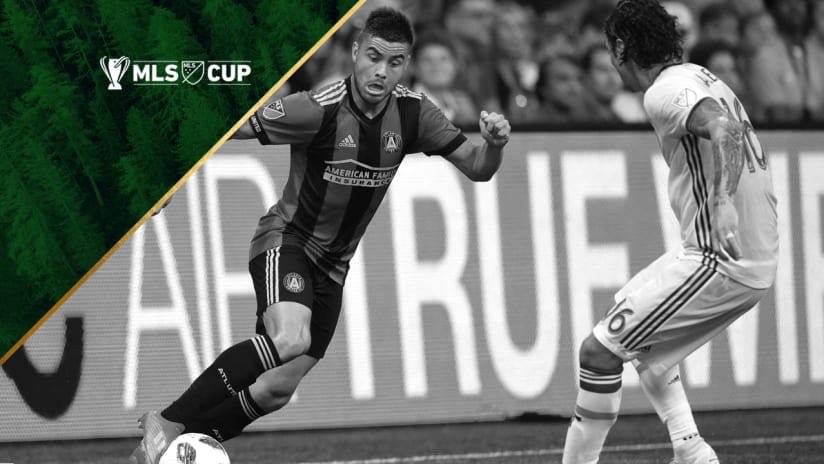Major League Soccer’s national punditry and local experts have cast Atlanta United FC as favorites in Saturday 2018 MLS Cup (5pm PT, FOX), and with good reason. Since the franchise debuted at the dawn of the 2017 season, head coach Gerardo "Tata" Martino’s team has proved among the most potent and organized in MLS. In hindsight, only the inexperience inherent in a first-year squad kept the Five Stripes from MLS Cup’s heights in their first season.
That reality was affirmed during the last two weeks, when Atlanta never trailed the Supporters’ Shield-winning New York Red Bulls over two legs, leading for almost two hours while eliminating the East’s frontrunner, 3-1 (agg.), in the Audi 2018 MLS Cup Playoffs Eastern Conference Championship. Still, if you go back and look at that series, you’ll find a.) a tightly-contested initial half-hour, b.) New York holding their own for another 40 minutes, before c.) the first leg opened up, and Atlanta put the series away.
Not to get too M-theory about things, but there is a universe out there when central defender Tim Parker’s ability to judge a cross finds its way to Atlanta, and within that universe, New York comes much closer to making this year’s final. Now, in this dimension, we’re left asking: what if Atlanta’s next opponents don’t repeat the mistakes of their last?
That next opponent is the Portland Timbers, and over the course of 90 (or 120) minutes on Saturday, they will fight Atlanta for a title which, for both clubs, will mean so much. For United, a crown will culminate a steep ascent poised to cast them as Major League Soccer’s flagship franchise. For the Timbers, though, a second title in four years – with a first-place regular-season finish in the Western Conference in between – will end any debate as to whether Portland’s earned a place among MLS’ elites.
Level-by-level, here’s now those two teams match up, with heavy focus placed on Atlanta’s first 31 minutes against New York, as well as the decisive, three-goal stretch Portland and Sporting Kansas City conjured in Kansas.
Atlanta’s defense versus Portland’s attack
Throughout the course of the season, Martino has increasingly leaned on a three-centerback system, one Atlanta is likely to play on Saturday. The team also has a 4-2-3-1 formation in them, but given how well they’ve played their 5-3-2, the most recent setup has to be an opponent’s primary focus.
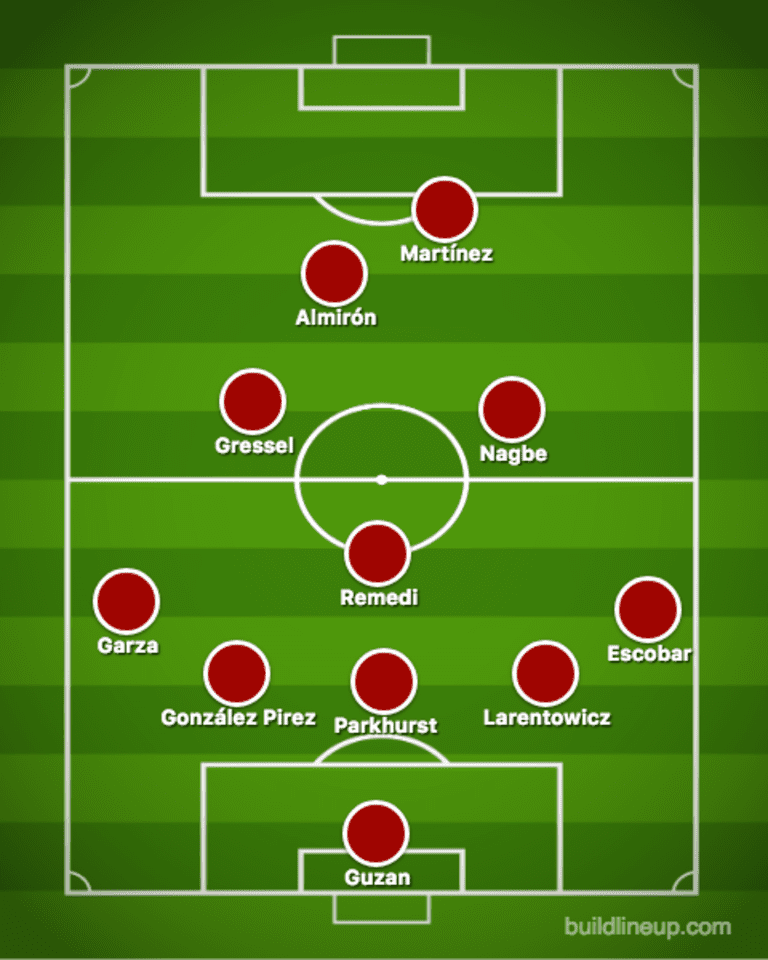
In the abstract, some of the first things I’d want to know about any three-centerback setup is 1.) how early and how far up the field at they allowing their widest defenders, their two fullbacks, to push, and 2.) how much protection are those three central defenders getting from their midfielders. In some systems, the wingbacks are more midfielders than defenders, and under the most aggressive approaches, they are involved in pressuring the opposition’s fullbacks. In those cases, you sometimes see teams employ two defensive midfielders, a measure that helps maintain a balance between attack and defense.
Other approaches will be less brazen with their wide defenders. They’re act more like fullbacks than midfielders or wingers. When that’s the case, you can see teams play with only one defensive midfielder, with a true five-man back line needing less protection.
Witness Atlanta, here, these two screenshots from leg one against New York: one as Red Bulls goalkeeper Luis Robles is about to play long, and the next when United is defending a potential New York counter:
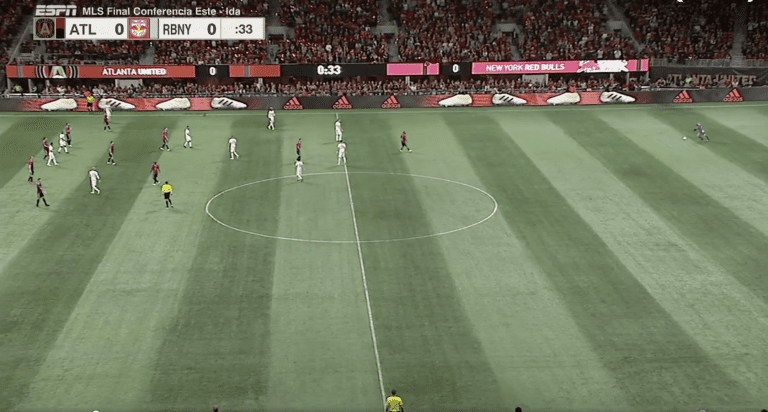
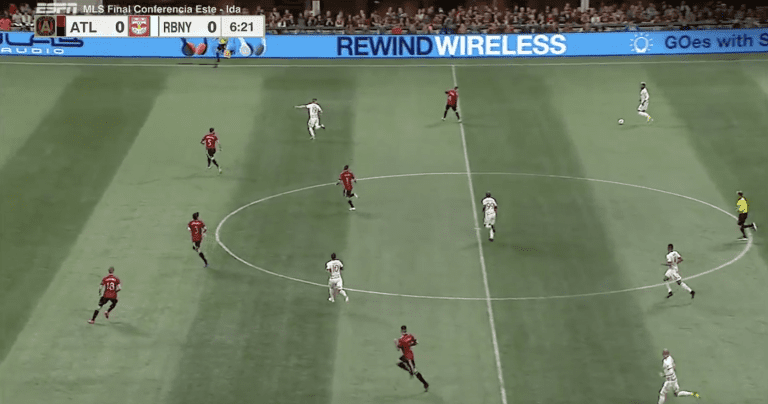
This isn’t an aberrational moment. Atlanta leans on Franco Escobar (bottom) and Greg Garza to get forward and serve as targets for diagonals higher up the field, but that happens when the team establishes possession and tries to transition through midfield. When Atlanta is not on the ball, they’ll keep their wingbacks deep, allowing their defense to get by with only Eric Remedi in defensive midfield, thus letting the team’s two other midfielders (Julian Gressel and Darlington Nagbe) get involved in the pressing game higher up the field.
Here, see how Escobar stops pursuing the ball, retreats to his normal position, while Nagbe ends up losing New York's left back down.
For the Timbers, that five-man defense means (potentially) more space in front of the defense, to the left and right of Remedi, and less incentive to attack channels between defenders. However, when Gressel and Nagbe drop beside Remedi, those spaces quickly close up, giving your attack limited options.
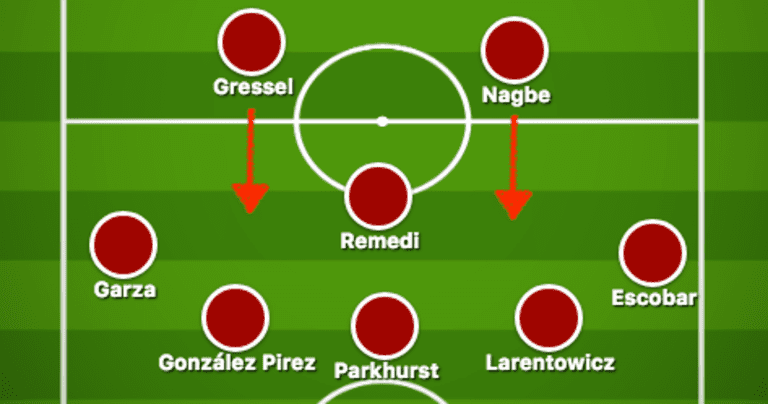
Sure, in that scenario, you’re getting Atlanta to play with eight men deep, but it also becomes more difficult to score goals. And by and large, when you’re dealing with a potent attack, this is a trade-off you want. If they have to commit eight men behind the ball, let you have possession, but you keep running into their block’s brick wall, you take that in lieu of letting the Miguel Almiróns and Josef Martínezes become your Zoltars.
The key for opposing teams, here, is to not only break lines and get behind Atlanta’s highest midfielders but also execute quickly enough that they can’t recover. That’s when you force players like Remedi and United’s central defenders – Jeff Larentowicz, Michael Parkhurst and Leandro González Pirez –to make tough decisions. Do they engage the player who’s receiving the pass, leaving space for the other team to pass into? Do they let a teammate do that, thus risking nobody confronts the ball? Do they prepare for the next pass, since so many balls into this area are merely the next-to-last step before a move on goal? Or do they start pressing even higher, leaving more space behind, in an effort to deny the initial ball?
This is where is gets scary for Atlanta. In the last round, New York was out of the game before they had tried to test these areas of the field. In leg one, they began patiently, waiting for chances to counter, but saw the game thrown off balance when their defense broke down. After that, players like Gressel and Nagbe could afford to drop earlier and occupy those vacant spaces, knowing their priorities sways more toward prevention than scoring.
But what if that scoreless detente persists longer against Portland? Or, planning for one game instead of two, the Timbers aren’t content to merely wait for counters over the matchup’s first moments? What if Diego Valeri and Sebastián Blanco show more ambition toward attacking those spots – Diego Chara and David Guzmán show more intent on finding them – and Atlanta has to, more often, balance their risk with their reward?
No matter where United land on those scales, breaking down Atlanta won’t be easy. Though their team is known for their attack, the Five Stripes also have three strong, experienced defenders given license to stay home. And, they have a scheme that puts them in positions to excel.
As the Red Bulls found out, scoring goals on Atlanta United is tough.
Portland’s midfield versus Atlanta’s midfield
When you think about Portland’s matchup last round against Sporting Kansas City in the Audi 2018 MLS Cup Playoffs Western Conference Championship, Chara and Guzmán must have done a hell of a job. True, at the beginning of the second leg, they could have perhaps done more to blunt Sporting’s start, but really, the entire team as a step slow. Over the rest of the series, the two men tasked with making the Timbers’ midfield work had to win a war despite playing against Felipe Gutiérrez, Roger Espinoza and Ilie Sánchez and being outnumbered.
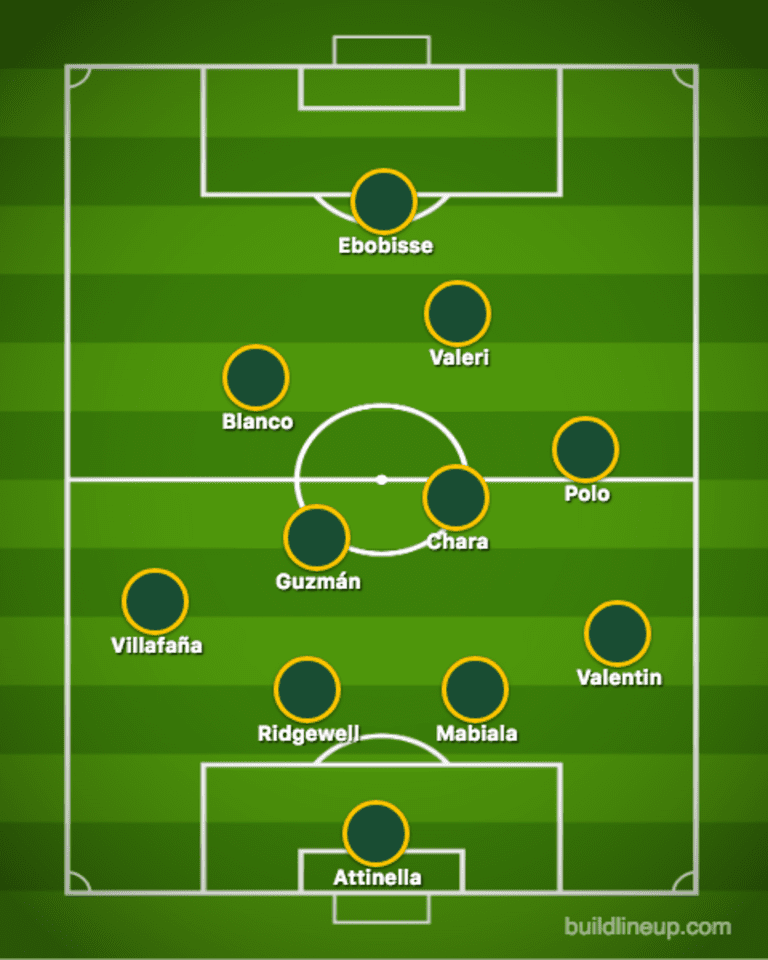
In the Timbers’ 4-2-3-1 formation, Valeri is listed as a midfielder by default, but functionally, he is a forward; or, at least, he is an attacking midfielder that shades more toward a supporting striker than a central midfielder. What the means for the matchup between midfields is, as Chara and Guzmán were against Sporting, they will be waging an uphill battle, with the Timbers enjoying the fruits of their efforts elsewhere on the field.
Against, Gressel, Nagbe and Remedi – two of which will be looking to stay high in the middle – that makes it almost impossible to imagine a Timbers victory without a good night from Guzmán. What’s more, the force multiplier Chara has been throughout his Timbers career will have to be there, again, on Saturday. If Chara can’t keep providing two men’s output, the numbers just don’t work.
But even if Chara can balance the numbers, the Timbers will be dealing with two special players. Nagbe, everybody in Portland knows about, and as Atlanta fans get to enjoy, there may be no better connective presence in U.S. soccer.
Gressel, though, deserves his own paragraph, too. Last year’s MLS Rookie of the Year took another step forward this season – a huge one. Whereas his first year as a professional was admirable for his ability to provide consistent, reliable performance, this year the German-born midfielder’s work rate, versatility and intelligence has made him a perfect balancing piece in the middle – often an ideal third or fourth man into attack.
The Red Bulls found that out the hard way, with this run creating what, in hindsight, was New York’s back-breaking goal.
If Gressel is doing things like this, it may be too much to ask Chara and Guzmán to win the midfield battle. In fact, it may behoove the Timbers to avoid the conflict entirely, focusing instead on maintaining possession that will force United’s midfield deep or, early, dropping into their defensive shape and not risking too much in the middle. If Gressel is making that looping run into a set defense, it’s almost no harm, no foul.
In either scenario, though, Chara and Guzmán will remain important. They’ll either be some of the first players moving the ball out of the back, springing Blanco and Valeri on the counter attack, or they’ll be at the edge of Portland’s final third, playing those line-breaking passes the team will need to set Atlanta’s defense in motion.
Portland’s defense versus Atlanta’s attack
From the outside, when facing a team as potent as Atlanta, this seems like the most important part of the field. And when you’re up against arguably the two most valuable players in the league (Almirón and Martínez), there are some clear areas of focus. Together, they combined for 43 goals and 20 assists during the regular season. By themselves, they outscored the Colorado Rapids.
But to deduce Atlanta is a team that need flow through their two biggest stars would be a dangerous oversimplification, in addition to being flat-out wrong. In fact, because of how MLS as adjusted to Almirón’s and Martínez’s talents, Atlanta often has to employ a surprisingly different approach. Whereas the first year of life under “Tata” Martino was filled with beautiful, flowing soccer, defenses have increasingly dared United to play longer, and more direct. And Atlanta has taken them up on that offer.
Witness this screenshot from that first half-hour against New York.
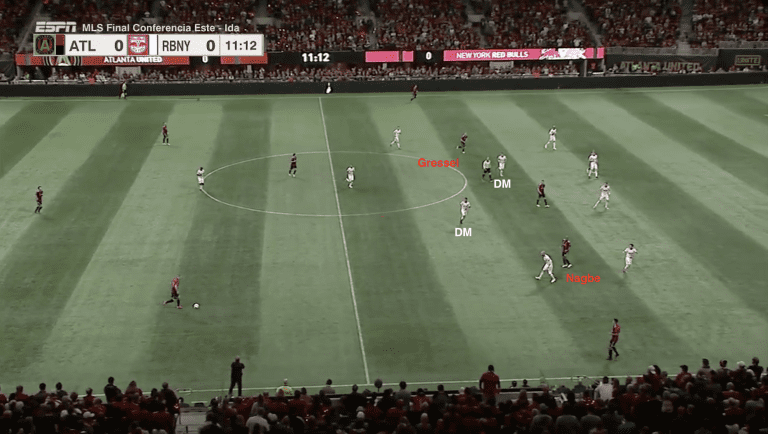
The Red Bulls have kept both of their defensive midifelders, Tyler Adams and Sean Davis, very deep, something that makes senses, given Gressel and Nagbe both like to get forward. Nagbe will often drop from his height, offer players like Larentowicz, Parkhurst and González Pirez options, but other times, those back line is willing to take what the defense gives then, using the opponents’ tendency to stay tight to Atlanta’s attacking four against them.
Thus, you end up with a lot of long, diagonal balls to players like Escobar, on the right, or Garza, on the opposite flank. Those wingbacks aren’t given much license to burst forward early in the transition phase, but if you’re going to play off Atlanta – if you’re only going to have one or two players try to pressure the four they keep back – they’ll throw their wide players forward, possess until their shape is right, and then boot the ball.
Check out Escobar and Garza (circled, below) as Atlanta launches one of those long diagonals.
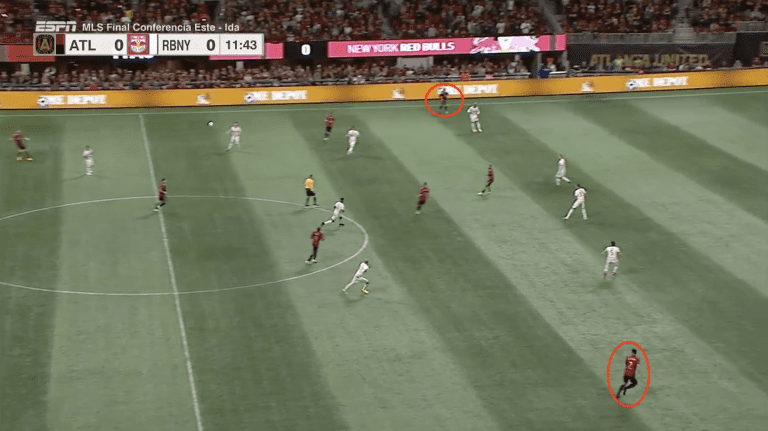
At that point, they’ll either win possession or have you in a place where you’re susceptible to be pressed. Even if you do win those battles, they’ve gotten your back line to play wider, which will create wider channels for Almirón, Gressel and Nagbe to explore, or provide more room to target Martínez.
One obvious solution, here, would be to play with a back five of your own, as Portland did on their first trip to Atlanta this season. United wasn’t playing with wingbacks, then – Martino chose a 4-2-3-1 – but against United’s new setup, a back five would still have its virtues. It allows you to address Atlanta’s ability to play direct (and wide) without exposing space in your defense.
The other option would be to play a 4-3-2-1, another look Portland has employed regularly this season. That would allow the fullbacks to matchup with Escobar and Garza while, with extra deep midfielders to protect wider channels, having a better buffer in front of a stretched defense. With that setup, you don’t necessarily have to commit to an extra defender, but you still address one of United’s preferred options.
The other choice, of course, is to just let Atlanta play those passes and accept them as a lesser of evils. Would you rather be aggressive, move out of your normal formation, and expose more space for Martínez and Almirón? Or would you rather keep your defense tight, know that gives Atlanta a route forward, but bet on being in the right position to defend the next ball?
That last option sounds great in theory, but it’s also, essentially, what the Red Bulls tried to do. That brings us back to that first, crucial 31 minutes in the Eastern Conference Championship. As long as the Red Bulls executed, their plan worked. In fact, it more than worked. The team looked comfortable. Atlanta failed to generate a good chance. But once Parker misjudged a cross, and his teammates failed to respond, the questions began. Should New York have pressured more? Should they have done more to prevent Larentowicz’s cross? Should they have been more circumspect, suspicious about giving Atlanta control?
That singular, stylistic question, was the most important for Portland to answer over the last four days. In the film from two weekends ago, there’s plenty of reason to believe a similar approach to New York’s, executed with a defense that’s not making such simple mistakes, could hold out. But, if the Timbers coaches see that as merely holding out – if they don’t have a way to build off it, and be dangerous going forward – Portland could end up Red Bulled.

